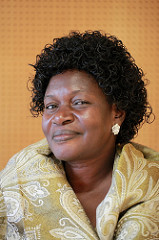Ms. Margaret Arach Orech
Margaret views her work with the ICBL as a means of providing representation for the many landmine survivors and persons with disabilities in her country and around the world, some of whose voices may not otherwise be heard.

© Stephane de Greef
In December 1998, Margaret Arach Orech celebrated Christmas in the Intensive Care Unit at St. Mary's Hospital in Lacor, Northern Uganda. Among other things, Margaret thanked the Lord for preserving her life during an ambush on her bus, which was carried out by the rebel movement Lord’s Resistance Army. Besides the period of reintegration and rehabilitation for her amputated leg, she was faced with the enormous task, as a single parent, of providing material and financial support for her five children. Nevertheless, her volunteer work started almost immediately, initially taking the form of peer support to victims of conflict for in-patients at local hospitals. It was here that Margaret identified the urgent need for peer support in her country.
In September 2000, after an intensive year of change, Margaret learned of the ICBL while attending a landmine conference in Harare. As a survivor, she felt challenged to take action and decided that advocating on behalf of the thousands of survivors would be her next step, and the best way she could give back. Ever since, Margaret has lobbied tirelessly for assistance to landmine survivors and persons with disabilities at the international, regional and national levels.
As an Ambassador for the ICBL, Margaret continues to highlight the plight of landmine survivors as well as advocate for their needs and rights with the international community. She is the Director of the Uganda Landmine Survivors Association (ULSA), a Commissioner to the Interfaith Action for Peace in Africa (IFAPA) coalition, a board member of Uganda’s National Council for Disability (NCD), and a partner to the Uganda Mine Action Center.
"What happened to me and other victims should never have happened. We are innocent civilians," says Margaret. "Countries must stop using landmines, all existing mines must be destroyed and governments must keep their promises to survivors. I had education on my side and could work again, but worldwide most victims come from rural areas, are often women or children and are mostly poor. That is why it is easy to forget about them. We dare not."
She has taken this message across the world, speaking in 15 countries, at over 100 official events, in 5 continents. In 2014, Margaret was selected as a Woman PeaceMaker by the prestigious Joan B. Kroc Institute for Peace and Justice at University of San Diego.


